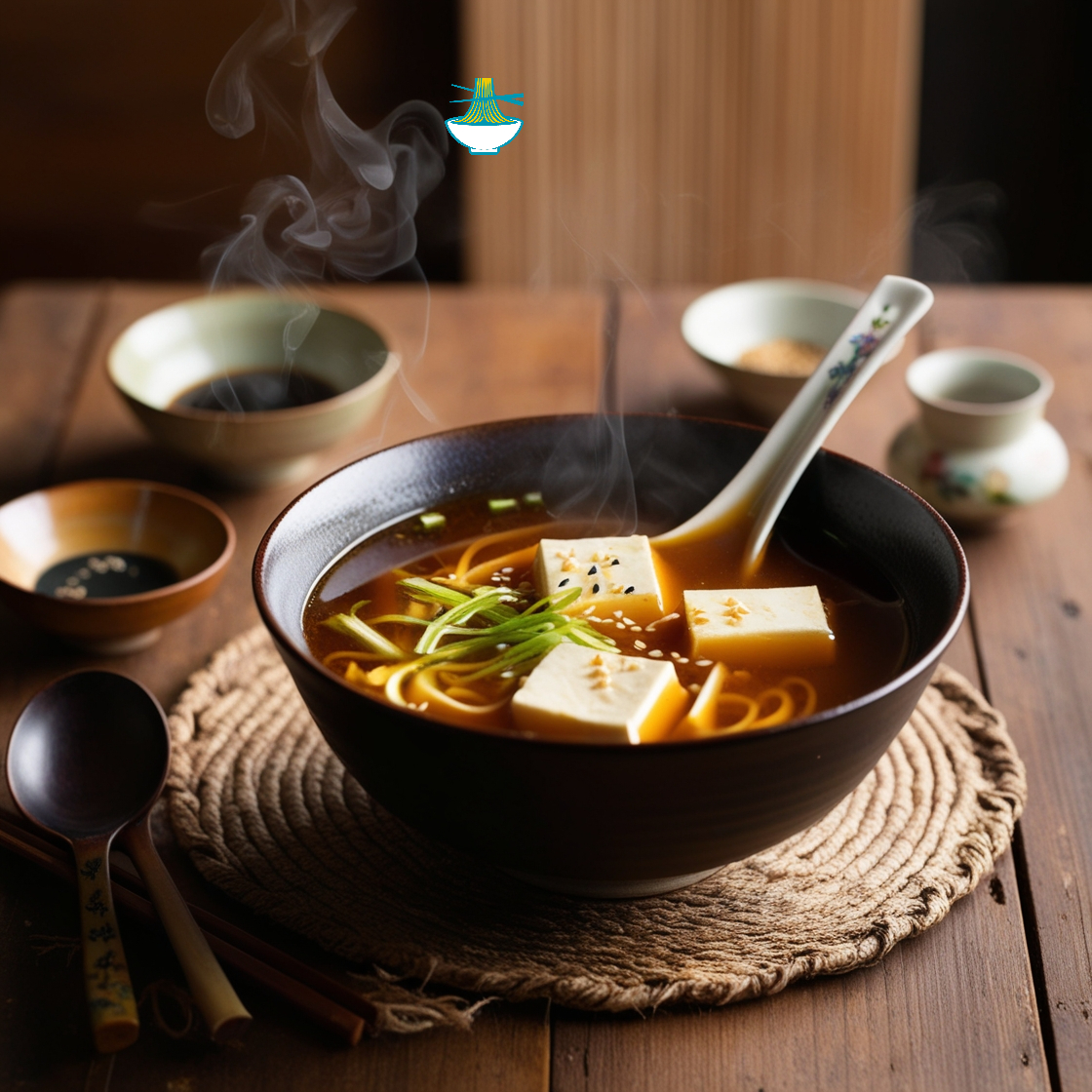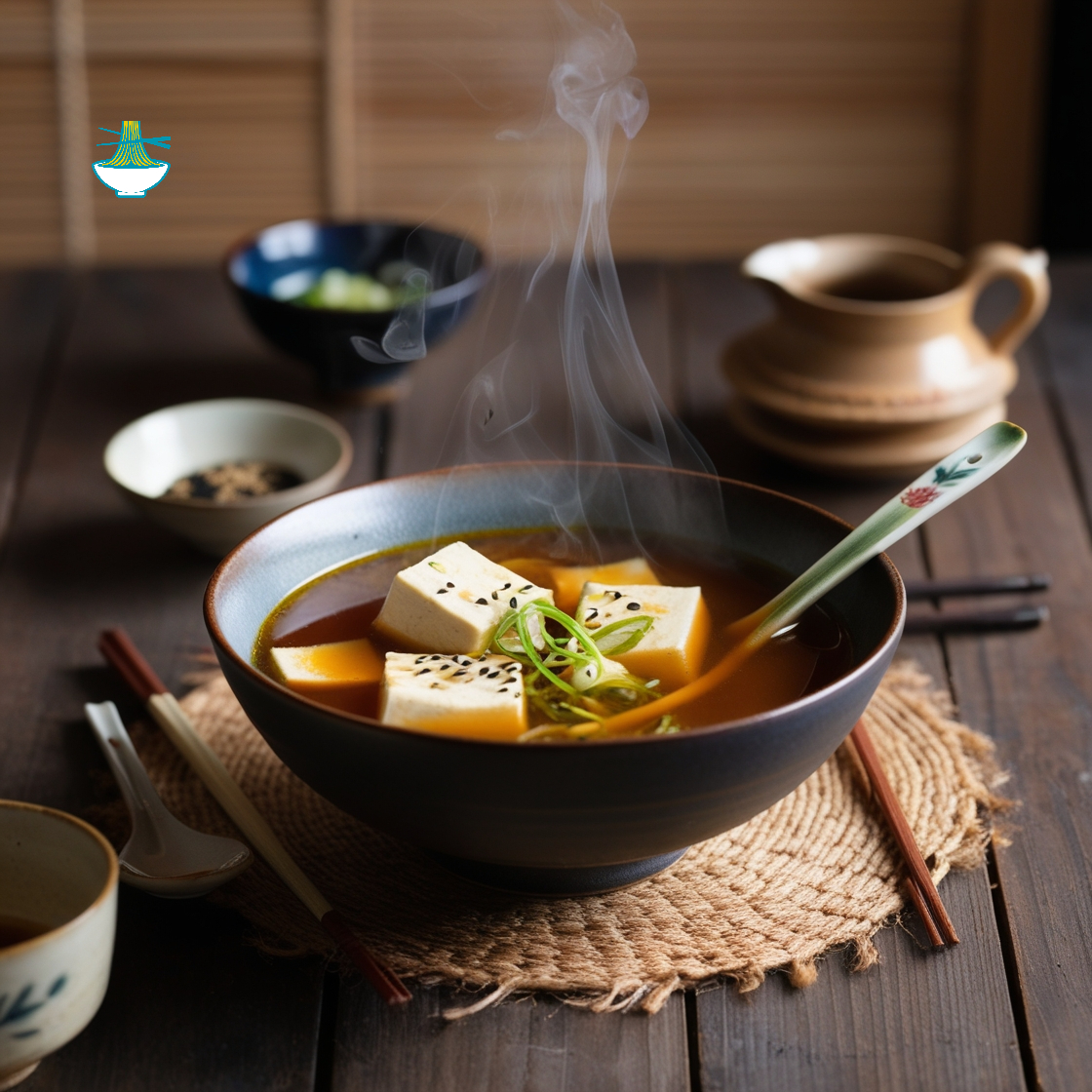Learn how to make traditional Miso Soup, a classic Japanese dish renowned for its savory umami flavor. Made with fermented soybean paste, this easy-to-follow recipe will bring the taste of Japan to your table. Discover the art of Miso Soup preparation and its cultural significance with our step-by-step guide. Dive into the world of Japanese cuisine today!
Here's a simple recipe for Miso Soup:
Ingredients:
- 4 cups dashi (Japanese soup stock, can be made from kombu and bonito flakes)
- 3 tablespoons miso paste
- 1 block tofu, diced
- 2-3 green onions, chopped
- Optional: seaweed, mushrooms, vegetables, or cooked protein like shrimp or chicken
Instructions:
1- Bring the dashi to a simmer in a pot.
2- In a small bowl, mix the miso paste with a bit of the hot dashi to dissolve it.
3- Add the miso mixture back to the pot and stir well.
4- Add the tofu and any other optional ingredients.
5- Simmer for a few minutes until everything is heated through.
6- Garnish with chopped green onions and serve hot.
Enjoy your homemade Miso Soup!
Nutritional Values:
Here are the approximate nutritional values for the ingredients in the Miso Soup recipe:
1. 4 Cups Dashi (Japanese Soup Stock)
- Calories: ~30 kcal (for 4 cups)
- Fat: ~0.5 g
- Carbohydrates: ~1 g
- Protein: ~2 g
- Benefits: Provides a savory base with minimal calories. Rich in umami flavor and can contain minerals from kombu and protein from bonito flakes.
2. 3 Tablespoons Miso Paste
- Calories: ~90 kcal
- Fat: ~3 g
- Carbohydrates: ~12 g
- Protein: ~6 g
- Benefits: Fermented soybean paste that adds depth of flavor. Rich in probiotics, which can support gut health. Contains vitamins, minerals, and antioxidants.
3. 1 Block Tofu, Diced (Approx. 200g)
- Calories: ~160 kcal
- Fat: ~10 g
- Carbohydrates: ~4 g
- Protein: ~16 g
- Benefits: Provides plant-based protein and is a good source of iron and calcium. Supports muscle health and overall nutrition.
4. 2-3 Green Onions, Chopped
- Calories: ~10 kcal
- Fat: 0 g
- Carbohydrates: ~2 g
- Protein: ~0.5 g
- Benefits: Adds flavor and contains vitamins A, C, and K, as well as antioxidants. Supports immune health and provides a mild, fresh flavor.
5. Optional: Seaweed (e.g., Wakame)
- Calories: ~10 kcal (for a small serving)
- Fat: ~0.2 g
- Carbohydrates: ~2 g
- Protein: ~1 g
- Benefits: Provides vitamins and minerals, including iodine, calcium, and magnesium. Adds a unique flavor and nutritional boost.
6. Optional: Mushrooms (e.g., Shiitake)
- Calories: ~15 kcal (for a small serving)
- Fat: ~0.2 g
- Carbohydrates: ~3 g
- Protein: ~1 g
- Benefits: Adds flavor and contains vitamins D and B, as well as antioxidants. Supports immune health and provides additional nutrients.
7. Optional: Vegetables (e.g., Spinach, Carrots)
- Calories: Variable, depending on the vegetable
- Fat: Variable
- Carbohydrates: Variable
- Protein: Variable
- Benefits: Adds fiber, vitamins, and minerals. Enhances the soup’s nutritional profile and flavor.
8. Optional: Cooked Protein (e.g., Shrimp, Chicken)
- Calories: Variable, depending on the protein
- Fat: Variable
- Carbohydrates: 0 g
- Protein: Variable
- Benefits: Adds additional protein and nutrients. Enhances the heartiness of the soup.
These values are approximate and can vary based on specific brands or types of ingredients used.


Comments